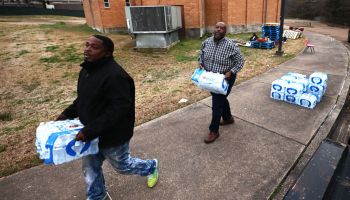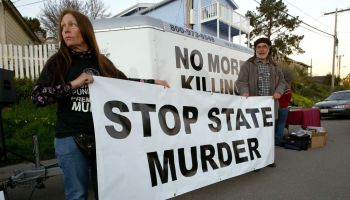Much has been said about Michael Vick’s return to the NFL after serving 18 months in a federal prison for dog fighting. And I don’t have too much more to add to the discussion. As a pet owner, I cringe at the thought of someone torturing puppies. At the same time, there are many people in this world that are not treated as well as dogs. And not so long ago, this country used dogs as a weapon to torture other people.
I’d imagine that Vick has had more than ample time to ponder over his poor life choices, and the stupidity and cruelty that cost him a $130 million contract with the Atlanta Falcons. The Philadelphia Eagles are giving him a second chance, and I guess that’s their decision.
But there are thousands, no, millions, of everyday people who have served their time and paid their debt to society, yet they can’t get a minimum wage job flipping burgers. They need a second chance just to survive.
This army of lost men and women is unable to support their families and become productive members of society because society will not let them. They wear a scarlet “F” for felon on their shirt. And they are punished not only for the crimes they committed. They receive extra punishment above and beyond their sentence, in the form of life, career and educational opportunities from which they are forever barred. A person with a criminal record cannot work in certain occupations, is ineligible for certain college tuition loans, and may not qualify for public housing and other public welfare benefits. That is the sign of a society built on vengeance and retribution, rather than rehabilitation. It is what some observers call a public banishment or civil death. Society has cast out the individual in a sense- unable to fully participate in a free society after regaining freedom, remaining a virtual prisoner even after the bars are removed.
And what has all of this punishment for punishment’s sake actually done for America? The tough on crime approach has helped the careers of some politicians, but surely it hasn’t made us any safer. I suppose there are some crimes that merit prison time, and people must be held accountable for the harm they do. But there are few creative, constructive forms of alternative punishment that make the community whole and make the prisoner a better individual.
At the same time, the U.S. has an overdependence on incarceration, if not an addiction to it. The nation uses prison bars as its primary method of social control, and as a way to earn profits, too. The so-called “land of the free” has the most prisoners- in absolute numbers and per capita-in the world. One in four of the world’s prisoners are locked up in a nation with only 5% of the world’s population. Brutal dictatorships and repressive communist regimes don’t even come close.
Broken schools, poor healthcare and early childhood development, and the disappearance of jobs prepare many poor children for little else than a cradle-to-prison pipeline. Prison walls do not create nurturing environments, but more proficient criminals, who during their lives walk through a revolving prison door. Many are imprisoned for nonviolent, drug-related offenses for longer and longer periods of time. Three-strikes laws and other draconian sentencing schemes are way out of proportion to the crimes committed.
The consequences of over-punishment are seen across the country, as states in need of cash cannot afford their ballooning prison budgets. In California, a federal court has ordered the state to reduce its overcrowded prison population by 40,000 inmates. If so many inmates are to be released, it makes you realize that many of them probably shouldn’t have been in there in the first place.
America’s reliance on punishment only serves to break up families and communities, rarely helping to rebuild them or those who have served their time. Many would be surprised to know that the right to vote, a cherished right of citizenship, is denied to 5.3 million Americans with felony convictions. These felony disenfranchisement laws are a holdover from the Jim Crow era, a time filled with all sorts of bad intentions. This madness must stop, and Senator Russell Feingold (D-WI) and Representative John Conyers (D-MI) have introduced legislation to restore voting rights in federal elections to millions of disenfranchised people. How do you expect ex-felons to become productive citizens when they can’t find a job, can’t afford to better themselves through education, and can’t even vote?
Some are behind bars for the crimes they have committed. Others are there for crimes they did not commit. Either way, when they return to the street, the punishment continues. Punishment on top of punishment does not work, and we have to build up the formerly incarcerated so they do not fall down again. We have to ensure that they have the opportunity to contribute as full-fledged members of society.
BlackCommentator.com Editorial Board member David A. Love, JD is a journalist and human rights advocate based in Philadelphia, and a contributor to the Progressive Media Project and McClatchy-Tribune News Service, among others. He contributed to the book, States of Confinement: Policing, Detention, and Prisons (St. Martin’s Press, 2000). Love is a former Amnesty International UK spokesperson. His blog is davidalove.com.
















